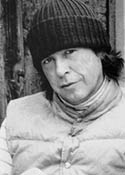

The Fourth of July—as we stand up to salute or sit down to ponder the flag that symbolizes our country—is an apropos time to discuss ongoing national controversy. And we Americans do hold some views too gut-level-passionately to be polite about them.
Why just the other day a feminist citizen made a sneering remark to me regarding one of the bathrooms of the realm: "Obviously some man had just been in there—the toilet seat was up."
Thus the bitter controversy that rages sea to shining sea ever since Tom Crapper invented our indoor flush toilet. It is a perennial flap in the columns of Ann Landers and lesser-known American editorialists. But the origins of this female resentment go back much further than the-always-seated Betsy Ross, the thirteen colonies, the outhouse, or even the flagpole . . .
Probably to when women climbed down out of the leaves with us. Did Paleolithic woman resent Paleolithic man because he could pee standing and pointing while she had to squat? If so, such resentment must have reached revolutionary fervor by the late 1700s when Old and New World women had to wrestle all those corsets, petticoats, hoops, and other man-pleasing fafaraw. Man—who while knocking out a pipe and pointing it into the future with one hand—could just flip open a codpiece and hiss against the old tree.
I have fallen back into the toilet a night or two myself. Missed my sit. If I blame someone else for my shocking wakeup—someone who didn't lay the seat down—I give away my power and lose control over my own life and destiny. Anyone—like me—who doesn't look, is not actually here in the present moment, is not in the real world. But—yow!—that plummet into cold water jolts you right back.
No one—blonde or not—is exempt from the real world. If you plunk your butt without looking, you are asking for an alarming lesson in reality. Like when you sit down on your glasses. Down on a scorpion. Down on some joker's star-spangled whoopee cushion. In the real world a toilet seat is on hinges. It might not be down. What grownup patriot would step into the street—even at a crosswalk on parade day—without looking?
When I do cross and enter one of our republic's restrooms to sit and ponder this great nation, I consider an upright toilet seat a goodwill salute of courtesy. It signals me the welcomed fact that the previous citizen did not have the arrogance and disrespect to try to stream pee through the hoop and rain sprays where I am about to plunk. And so I make it a point to leave the goodwill gesture myself. As a flag of courtesy.
But perhaps Betsy's resentment is merely as simple as that she doesn't like to have to take the time to let that seat down. Should I have to take the time? I like a fair world. I am willing to leave the seat down for her, if she is willing to leave it up for me. Fair is fair . . .
Unless our flag-maker's perception of an unfair world is the Paleolithic one—that it just takes a damn man less time to do his business. And that now finally, since Thomas Crapper's contraption, woman can even-up the times by insisting that man both lift the seat and lay it back down—while she never does either.
I thought the days bygone when woman looked to a man to take care of her. To open her door, walk on the outside, guide her with his arm, protect her ears from profanity, pay her bills, fend off reality, and rescue her from emotion. Feminists—a designation which does include men—know that all these so-called chivalries are based on the belief that woman is beautifully innocent, vulnerable, incapable, and helpless.
Today I witness our female citizens hanging their own doors, cursing their own taxi drivers, punching their own dates, proposing their own marriages, demanding their own names, owning their own houses and banks, and even jet-screaming our flag through bombs bursting in air. Do self-empowered American women such as these really resent lowering their own toilet seats?
You know, I wonder, as I sit here and ponder—after crossing the street and lowering a seat myself during this 230th fireworks of Independence—just how far our United States of America has really come. I don't think I'm going to jump up and salute. But I do wish you a gloriously jubilant Fourth of July . . .
 Dick Bakken, of Bisbee, Arizona, is a graduate of Washington State University’s M.A. program, and has taught at Washington State University, Pacific Lutheran University, Portland State University, Thomas Jefferson College, St. Andrews Presbyterian College, and Cochise College. He has given many reads throughout the Pacific Northwest and American Southwest, and has become a staple of the poetry festival scenes of the Western U.S.
Dick Bakken, of Bisbee, Arizona, is a graduate of Washington State University’s M.A. program, and has taught at Washington State University, Pacific Lutheran University, Portland State University, Thomas Jefferson College, St. Andrews Presbyterian College, and Cochise College. He has given many reads throughout the Pacific Northwest and American Southwest, and has become a staple of the poetry festival scenes of the Western U.S.






















